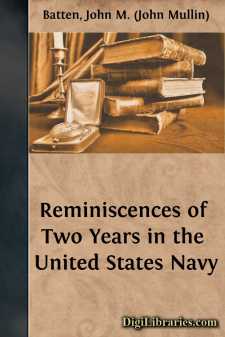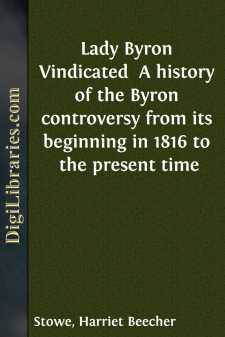Biography & Autobiography
- Adventurers & Explorers 15
- Artists, Architects, Photographers 16
- Business 2
- Composers & Musicians 14
- Criminals & Outlaws 5
- Editors, Journalists, Publishers 6
- Educators 1
- Entertainment & Performing Arts 3
- General 74
- Health, Exercise & Fitness 1
- Historians 3
- Historical 83
- Law Enforcement 1
- Lawyers & Judges 3
- Literary 147
- Medical 7
- Military 48
- Naturalists, Gardeners, Environmentalists 8
- Personal Memoirs & Diaries 227
- Philosophers 3
- Political 9
- Presidents & Heads of State 38
- Religious 38
- Rich & Famous 27
- Scientists 13
- Women 31
Biography & Autobiography Books
Sort by:
by:
William Cooper
PREFACE. Kind Reader, In attempting the life of my late brother, who, after struggling for years at the bar in almost obscurity, had, on a sudden, his brilliancy noticed and his great talents acknowledged, and no sooner had he reached that eminence in his profession, when all was made easy before him, than unpitying Clolho stept up, and cut his thread of life; I must ask your indulgence, for the...
more...
Chapter I. 1776-1794Josephine's voyage to France.In the year 1776 a very beautiful young lady, by the name of Josephine Rose Tascher, was crossing the Atlantic Ocean from the island of Martinique to France. She was but fifteen years of age; and, having been left an orphan in infancy, had been tenderly reared by an uncle and aunt, who were wealthy, being proprietors of one of the finest plantations...
more...
LETTER I. THE MURDER. Washington, April 17. Some very deliberate and extraordinary movements were made by a handsome and extremely well-dressed young man in the city of Washington last Friday. At about half-past eleven o'clock A. M., this person, whose name is J. Wilkes Booth, by profession an actor, and recently engaged in oil speculations, sauntered into Ford's Theater, on Tenth, between E...
more...
Chapter 1 A PEASANT'S SON A MONOTONOUS line of sand hills and the sea; a vast barren land stretching away in wave-like undulations far as eye can reach; marsh and heath and sand, sand and heath and marsh; here and there a stretch of scant coarse grass, a mass of waving reeds, a patch of golden-brown fern—the Landes. It was through this desolate country in France that a little peasant boy whose...
more...
by:
Jacob Abbott
His Childhood and Youth. B.C. 356-336The briefness of Alexander's career.Alexander the Great died when he was quite young. He was but thirty-two years of age when he ended his career, and as he was about twenty when he commenced it, it was only for a period of twelve years that he was actually engaged in performing the work of his life. Napoleon was nearly three times as long on the great field of...
more...
JOINING UP "Kitchener's Mob" they were called in the early days of August, 1914, when London hoardings were clamorous with the first calls for volunteers. The seasoned regulars of the first British expeditionary force said it patronizingly, the great British public hopefully, the world at large doubtfully. "Kitchener's Mob," when there was but a scant sixty thousand under arms...
more...
TWO YEARS IN THE UNITED STATES NAVY. After having passed an examination before the Medical Board of the United States Navy, which was in session at the United States Naval Asylum, Philadelphia, Pa., Dr. James Green, President of the Medical Board, I received the following appointment: Navy Department, 22d March, 1864. You are hereby appointed Acting Assistant Surgeon in the Navy of the United States on...
more...
by:
Ian Hamilton
PREFACE On the heels of the South African War came the sleuth-hounds pursuing the criminals, I mean the customary Royal Commissions. Ten thousand words of mine stand embedded in their Blue Books, cold and dead as so many mammoths in glaciers. But my long spun-out intercourse with the Royal Commissioners did have living issue—my Manchurian and Gallipoli notes. Only constant observation of civilian...
more...
by:
Thomas Moore
LETTER 508. TO MR. MOORE. "Genoa, February 20. 1823. "My Dear Tom, "I must again refer you to those two letters addressed to you at Passy before I read your speech in Galignani, &c., and which you do not seem to have received.[1] [Footnote 1: I was never lucky enough to recover these two letters, though frequent enquiries were made about them at the French post-office.] "Of Hunt...
more...
PART I. CHAPTER I. INTRODUCTION. The interval since my publication of ‘The True Story of Lady Byron’s Life’ has been one of stormy discussion and of much invective. I have not thought it necessary to disturb my spirit and confuse my sense of right by even an attempt at reading the many abusive articles that both here and in England have followed that disclosure. Friends have undertaken the...
more...











